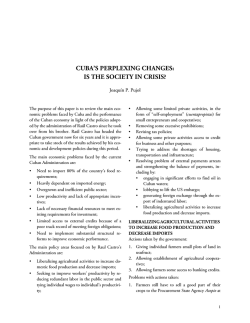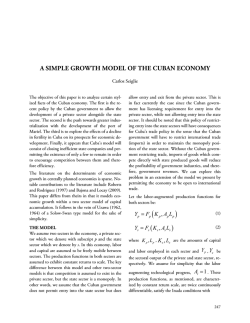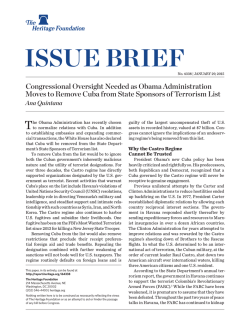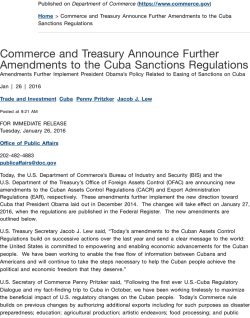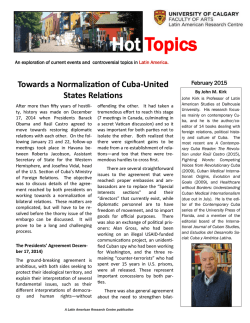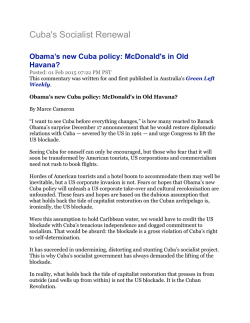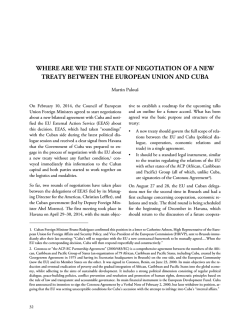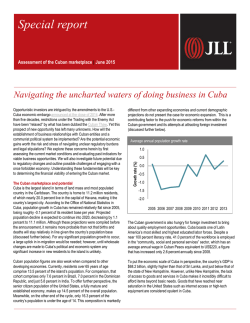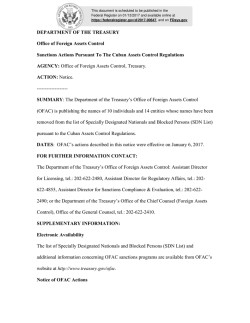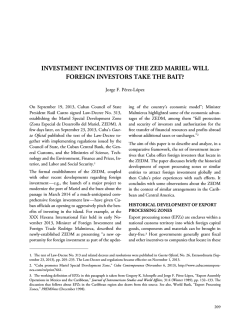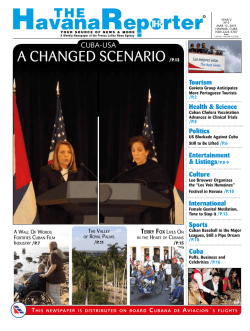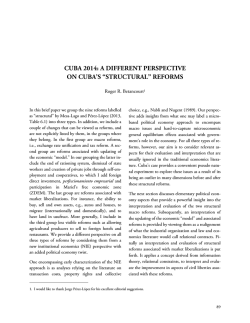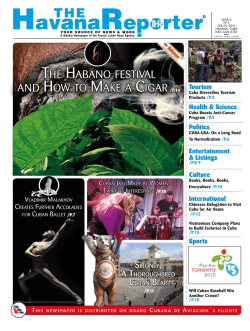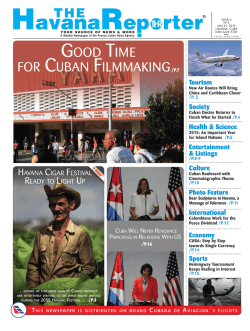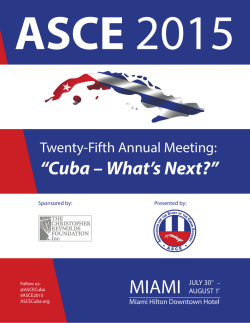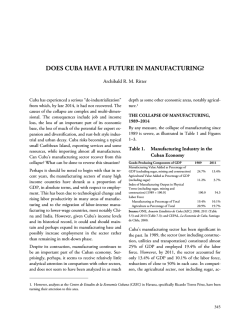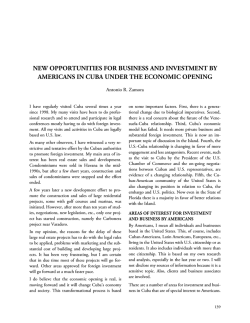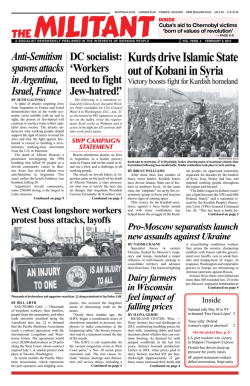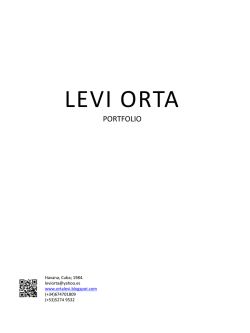
Jorge Perez-Lopez - Association for the Study of the Cuban Economy
THE POSITION OF CUBA’S INDEPENDENT TRADE UNIONS ON FOREIGN INVESTMENT — THE SPECIAL ECONOMIC DEVELOPMENT ZONE MARIEL (ZDEM) Victor Manuel Domínguez García Cuba has hailed as the “jewel of the economy” the special economic zone created in the port of Mariel, which is on the path to becoming a haven for the exploitation of workers and the benefit of corporations and government elites. The official statements made by the Minister of Foreign Trade and Investment and by the Director of the Office of the Special Economic Development Zone Mariel (Zona Especial de Desarrollo Mariel / ZEDM) are outrageous under the scope of the International Labor Organization’s (ILO) core conventions. Decree-Law 313, which established the ZEDM, promises a fiscal and deregulatory paradise, guaranteed by a centralized administration and a totalitarian state, that assures complete social and labor “stability.” The ZEDM is neither an original nor new idea. It substitutes the failed Mariel Duty Free Zone created by Decree-Law 224 of October 1997. This decoy of capitalist exploitation to attract foreign investment, together with the Mega Port of Mariel which just finalized its first stage of construction, are being built with the financial backing of a country where paradoxically labor laws are respected and by a corporation, Odebrecht, that is unionized in Brazil, the country where it is headquartered, as well as in the majority of countries where it operates. In Cuba, however, it is poised to achieve huge profits becom- ing an accomplice to a government that violates fundamental human and labor rights. Lured in by the bait of profits, as of May of this year — according to official sources — there are already twenty three corporate ventures seeking to locate in the ZEDM from the following countries: Spain, France, Italy, Brazil, Russia, China and the Netherlands. In announcing the creation ZEDM, the Cuban government stated that they designed this project based on similar export processing zones in other countries. We know what this means to workers. LABOR CONTRACTS The workers of the companies that will operate in the ZEDM will be contracted by state employment agencies. Only with them and through them shall all aspects of labor relations be resolved, from discipline and conflict resolution to the setting of wages. Workers will not have the slightest possibility of making any claims, individually or collectively, involving the foreign investor. Everything is negotiated with and handled by the employment agency. The Decree-Laws that regulate the ZEDM (Decree 316, Regulation governing the ZEDM) are explicit on this point: “To lend their services to concessionaires or users (investors), Cuban workers and foreign permanent residents in Cuba must previously establish their labor relationship with the designated Cuban entity” (Article 35). 145 Cuba in Transition • ASCE 2014 Companies will request personnel from the state employment agency. It is only with these agencies that salaries, schedules, vacations, qualifications and any other aspect of labor relations will be are negotiated and established by workers. Even in the case of termination of employment by initiative of the company, it is the agency that is indemnified, not the worker: “The concessionaire or user may return the contracted employee to the designated Cuban entity when, for just cause, requirements have not been met, proceeding to indemnify the aforementioned entity. In necessary instances, they may solicit the substitution of the worker by another” (Article 40). This is elaborated by an indemnification table, according to length of employment of the worker. If the end of employment is by initiative of the employee, they shall receive no indemnification: “Payment of indemnifications will not proceed when the return is by initiative of the worker” (Article 42). Note the authoritarian tone when referring to the workers and their relationship to production and their workplaces, for example referring to modification or termination of the employment contract as if it the worker were an object or goods to be exchanged. The term “return” of a worker is used in the most savage language of exploitation. In summary, there are no unions, there are no legal or administrative instances that protect the worker, and there is no direct recruitment, individual or collective, by the company. The absolute fate of the worker is under the iron fist of a totalitarian government. The twelve state employment agencies that will place the manpower in the Mariel concessionaire companies have already been selected. The right to right to freedom of association and collective bargaining is prohibited, which is a blatant violation of ILO Conventions 87 and 98. The monopoly of negotiating labor conditions and compensation belongs to the employment agency. That is to say, it is in the hands of the state. The cover up its Draconian treatment of labor, the decree states that all that concerns regarding “collec- 146 tive bargaining agreements, unionization and other indemnifications will be governed by the national legislation in Cuba.” But what room will the official trade union movement have to organize or negotiate if all things concerning labor relations are negotiated between the concessionary companies and the state employment agencies? The only role that the monopolistic Cuban Central Trade Union (Central de Trabajadores de Cuba, CTC) will be able to play is to collect the compulsory union and territorial militia dues from the workers. In an open violation of the ILO Convention 111, concerning discrimination (employment and occupation), it is known reliably that to be selected by an employment agency one must be a citizen “free of suspicion” regarding political loyalty to the regime, a member of the Communist Party and/or a member of the Committee to Defend the Revolution in the worker’s place of residence. Moreover, a rumor is circulating that within the Cuban Communist Party (Partido Comunista de Cuba, PCC) there exists a proposal to give advantages in hiring for the ZEDM to “demobilized workers from the Revolutionary Armed Forces (Fuerzas Armadas Revolucionarias, FAR) and from the Ministry of Interior, to ensure the success of the project.” SALARIES Cuba boasts that the state employment agencies will not retain 80% of salaries — as other joint venture and foreign owned companies do on the island — and instead they will only retain 20% and will transfer the remaining 80% to the workers. Compared to any other employment agency in the world, 20% is already a leonine share. However, the statement constitutes yet another farse. To begin with, from what the worker accrues, 5% goes to pay taxes and another 5% to social security. The salary will be set between the foreign company and the state agency in foreign currency or freely convertible currencies. The agency retains 20% and pays the remaining 80% to the worker in nonconvertible Cuban pesos. The Position of Cuba’s Independent Trade Unions on Foreign Investment Let’s consider the following example based on wages paid in US dollars or convertible pesos: Given a monthly remuneration of US$1,000.00, the agency will retain US$200.00. The agency will not, however, pay the remaining $800.00 to the worker at the official exchange rate of the Cuban peso CUP (US$1.00 = CUP24.00). Instead, they will make the exchange at the rate of US$1.00 = CUP10.00. This means that the worker will receive CUP 8,000.00, while the agency obtained CUP 24,000.00 (at the official rate of US$1.00=CUP24.00. This means that in reality, the workers obtain 33.33% of the amount that the agency obtained for the fruit of their labor. If one uses the Marxist concept of surplus value, the basis of capitalist exploitation of man by man consistent with the official ideology of the Cuban regime, to what levels of exploitation would the workers of the ZEDM be subjected without the right to negotiate their wages or their claims against the company? COMPANIES We warn companies considering investing in Cuba of the economic, political and social risks they will run should they be seduced by the easy profits offered by the ZEDM. The ZEDM offers ownership and exclusive use of the concessions, but states that in the case of “public interest or national security,” the Cuban government may terminate the concessions. No international jurisdiction for the resolution of conflicts or disagreements is recognized; one can only plead to the “People’s Courts” or to the Cuban Court of International Commercial Arbitration. This means that in a country with no separation of powers, the State will be judge and jury. Politically, they run the risk of being penalized by the new forces that might take power in a democratic Cuba. Socially, they may be liable for compensating for the gains made under the “social and wage dumping” in which they were complicit with the Cuban regime. They will violate the codes of conduct for multinational companies established by both the International Labor Organization (ILO) and the Organiza- tion for Economic Cooperation and Development (OECD), which will potentially and permanently threaten their international corporate image. They will likewise violate their own policies that promote social responsibility worldwide and flagrantly antagonize the decent work concept established by the ILO. Within Cuba and internationally they will face a campaign carried out by the Cuban independent unions and international trade unions for violations of labor rights enshrined in key international conventions. We remind companies that they DO have the ability to negotiate better working conditions than the Cuban regime would impose before consummating their investment agreements. They have a great deal of leverage in their international commitments under various existing fora and, in the case of some, the International Framework Agreements that their parent companies have signed with international trade union federations. TRADE UNION STRATEGY The Cuban Independent Trade Union Coalition, with the support of the International Group for Corporate Social Responsibility in Cuba, is in the process of preparing a clear union strategy for the ZEDM workers to achieve the labor justice they deserve. We will use as reference the extensive experience of unions and national centers (from both countries of origin of investment and receiving countries) and international trade union strategies to confront the injustices in other special economic zones, particularly those in Central America and the Caribbean. We will demand similar solidarity from international trade unions. We will take actions at all levels of the ILO to ensure they exert, through their regulatory and monitoring bodies, the necessary supervision, based on its fundamental principles, its conventions and its commitment to the promotion of decent work. We will establish relations with all unions who organize the same companies in other countries as well as in the home countries and the relevant national centers. 147 Cuba in Transition • ASCE 2014 We will systematically denounce all violations committed in the ZEDM, as we have done with respect to other sectors of the economy, before the mentioned trade union bodies as well as before organizations that promote human rights. These complaints will include discrimination and violations of basic rights exercised by state employment agencies. We will proclaim the universal nature of labor justice and the social responsibility of companies. We will ask the International Trade Union Confederation (ITUC) and the Trade Union Confederation of the Americas (TUCA) to show consistency with 148 the positions taken regarding other special economic zones. We urge that double standards not be imposed when it comes time to assess and act regarding the ZEDM. We will coordinate global campaigns to ensure fair labor practices in companies operating in the area with the concerned international trade union federations. We will challenge the state policy of police harassment perpetrated against workers and their independent organizations and will coordinate the struggles of these workers.
© Copyright 2026
